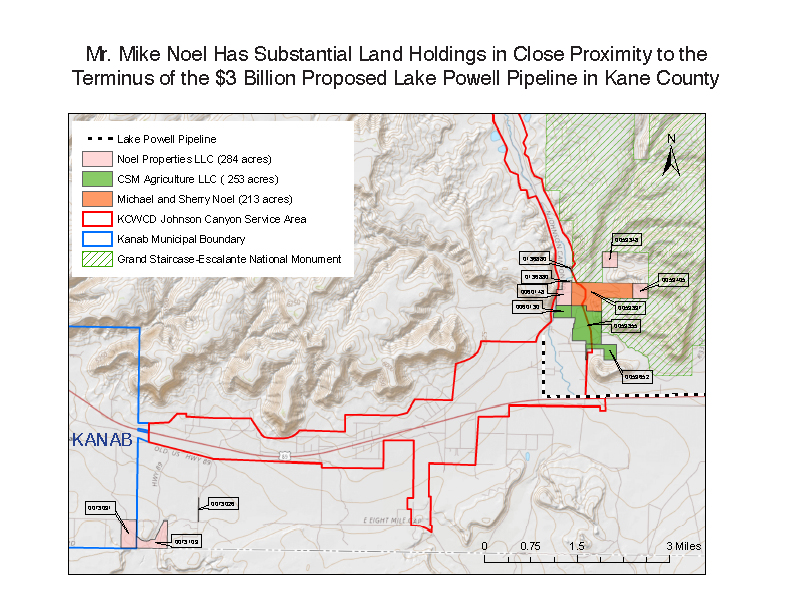
Utah Records Committee orders Mike Noel’s agency to provide Lake Powell Pipeline records to public
Will Mike Noel’s lands receive water from the $3 billion Lake Powell Pipeline, and if so, how was that decision made?
The Utah State Records Committee ordered Rep. Mike Noel’s water agency, the Kane County Water District, to provide all correspondences from himself, his staff and his board to the Utah agency, which decided to deliver Lake Powell Pipeline water to the lands adjacent to Noel’s properties.
The Utah Rivers Council submitted a GRAMA request to the Kane County Water District after filing a 38-page complaint requesting an investigation by the U.S. Attorney and the Utah Attorney General to determine how the alignment of Lake Powell Pipeline water was decided in Kane County. The water district refused to provide the records and asked for nearly $8,000 in fees, claiming the correspondences were on Noel’s personal computer.
At issue is how and why the $3 billion Lake Powell Pipeline would deliver as much water as a city of 20,000 people would use in a year to a rural area of Kane County with a population of just 270 people. This has generated controversy because it is also an area adjacent to the end of the Lake Powell Pipeline where Noel owns $4–8 million in land holdings.
The Kane County Water District claimed that Noel is a contracted employee who uses his personal computer and that the records were mixed in with Noel’s personal files and would be costly to separate. The district also claimed that the agency was not responsible for retaining official emails.
Several members of the Utah State Records Committee were surprised by this claim, and one member of the committee refuted the Kane County Water District’s claim by saying, “You can’t charge a petitioner for [the District’s] poor record keeping.”
State documents for the Lake Powell Pipeline indicated clearly that there was no need for pipeline water in Kane County because of the abundance of existing water sources there already. The documents also noted the expensive nature of Lake Powell Pipeline water. According to the Utah Division of Water Resources in 2008 and 2011, “Thus based strictly on water need, LPP supplies are not needed in the KCWCD service area within the 2060 planning horizon.”

But then, in 2016, the Division of Water Resources inexplicably released new documents deciding to deliver Lake Powell Pipeline water to a rural portion of Kane County with a tiny population. This delivery area is shown in the map above. The Utah Rivers Council GRAMA request seeks to understand why this change occurred and what role Noel played in it.
An estimate from University of Utah economists found that Kane County taxpayers will be burdened with some $150 million in debt by Lake Powell Pipeline construction and interest, which will require major increases to water rates, property taxes, and impact fees. The study found that water rates will have to increase by 538 percent, property taxes will have to increase by 61 percent, impact fees will have to increase by 344 percent, and the proposed Green River nuclear power plant must be licensed and constructed to repay Utah taxpayers for the Lake Powell Pipeline costs in Kane County.
“It is telling that Mr. Noel is trying to keep these public records a secret,” said Zach Frankel, Executive Director of Utah Rivers Council. “The public deserves to know how it came to be that this $3 billion proposed pipeline will deliver water only to a rural area of just 270 people near where he owns 750 acres of land.”



